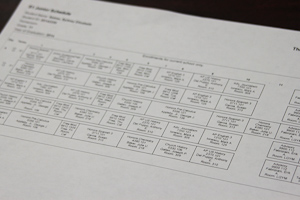For the school year 2013 – 2014, Principal Madelyn Ball and Vice Principal Gary Scholl, along with the department heads, are working on changing the organization of overall modular schedules.
“Nothing is definite yet. There’s only a committee of people investigating ways to make our schedule a little more flexible,” Ball said. “It’s very difficult to get everybody into the classes they want to take because we have time restrictions.”
According to Ball, the main goal is to offer a greater variety of courses, such as forensics, but more importantly, to enable students to be able to take desired classes.
“The schedule should never drive the curriculum. The curriculum should drive the schedule,” Ball said.
One suggestion from Ball is to find room for an eighth class, which would “free everything up as to when classes can occur.” The eighth class period would exist to make room for another class or create more flexibility for existing classes, according to Ball.
If the administrators were to pursue a schedule with an additional class, mods would have to be shortened. The AP classes, which already meet five mods a week, would continue to do so. However, the length is not determined.
Sophomore Rawlison Zhang also believes that “AP classes should meet five times a week, since they have more information to cover compared to other classes.” In addition, he suggests another solution instead of an eighth class. “Why don’t people just take classes over the summer either at JC or Harford Community College? I took English and U.S. History this past summer, and it was only a semester long,” Zhang said.
Because of the shortening of classes that would be needed for an eighth mod, Ball would not be able to lengthen classes, which she would like to pursue. The lengthening of classes is mainly to meet the accommodations of science, since the department needs extra time for experiments in the laboratory.
According to Ball, there are “no intentions of getting rid of the modular schedule.”
“Nobody was interested in doing a traditional schedule where you have classes meet the same time, same amount of time every day. There was no real interest in a block schedule either,” Ball said.
In 2007, the Use of Time Committee existed to examine possible schedules that JC could adopt. Each type of schedule, such as block, modular, and eight period six day cycles, were evaluated, looking at the pros and cons of each. After meeting, the committee realized that the current modular type of schedule suited the school community the best.
Now, five years later, it’s not the same case, according to Ball. “We haven’t found anything yet that truly works for us,” Ball said.
For now, department chairs are supposed to submit their needs for the new schedule.
Science Department Chair Julie Baker is only “in favor [of the schedule change] if it gives more time with classes.”
Baker believes every class should meet five days a week. Four of the five meetings should be around 45 minutes long. The remaining class should be an hour, which would be useful for lab assignments.
On the other hand, Religion Department Chair Joseph Gallen believes having classes meet every day would be impossible unless JC changed to a six day rotation schedule.
This type of schedule involves six different schedule days such as A, B, C, D, E, and F instead of Monday, Tuesday, Wednesday, Thursday, and Friday. The days rotate instead of having a set schedule for each day of the week. For example, if Monday is an A schedule, but school is closed, the schedule would not be missed, for students would follow the A schedule on Tuesday. This type of scheduling would reduce the amount of class time missed .
Instead, Gallen’s main concern is the last class of the day, since student athletes leave early for away games. Therefore, Gallen advocates for “some type of rotation for the last classes” such as the six day rotation schedule. Consequently, athletes would not consistently miss the same class at the end of the day each week.
In contrast, freshman Becca DiRocco feels differently. “Incoming freshman would have trouble figuring out what day it is,” she said.
“The long mods such as one, two, nine, and ten should be split evenly. Also, free mods should have more flexibility,” Zhang said.
Sophomore Ally Goheen elaborates on Zhang’s suggestion. “You don’t have to eat at a certain time if you’re not hungry,” she said.
However, DiRocco disagrees. Instead, she would prefer “a specific lunch period.”
On an undecided date in November, the administrators and department heads will hold a meeting to discuss further suggestions for the possible schedule. “It would freshen things up as long as it’s not too drastic,” Gallen said.
Sydney Setree is a Managing Editor for the Patriot and jcpatriot.com



